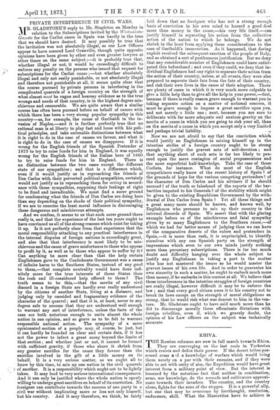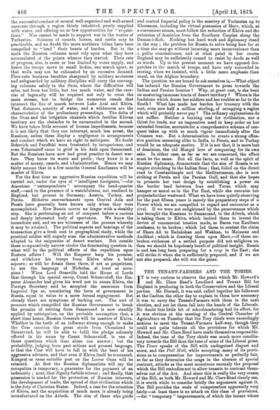KHIVA.
THE Russian columns are now in full march towards Khiva. They are converging on the last oasis in Turkestan which resists and defies their power. If the desert tribes pos- sessed arms a id a knowledge of warfare which would bring them nearly on a par with their enemies, and if they were able to act with unity of aim, the Expedition would have great interest from a military point of view. But the interest is lessened by the notorious fact that neither in combination, arms, nor knowledge, do the nomads and cultivators approxi- mate towards their invaders. The country, and the country alone, fights for the sons of the steppes. It is a powerful ally, but one that may be overcome by forethought, resolution, endurance, skill. What the Muscovites have to achieve is the successful conduct of several well-organised and well-armed caravans through a region thinly inhabited, poorly supplied with water, and offering no or few opportunities for " requisi- tions." War cannot be made to support war in the wastes of Turkestan. Seizures of camels, horses, and cattle may be practicable, and no doubt the more northern tribes have been compelled to " lend " their beasts of burden. But in the main the Russian columns must rely upon what they have accumulated at the points whence they started. Their rate of progress, also, is more or less limited by water supply, and hence the troops move in small bodies, one march apart, so that wells may not be exhausted by an excessive demand. First-rate business faculties sharpened by military acuteness and safeguarded by military discipline will carry the converg- ing columns safely to the Oxus, where the difficulties will arise, not from too little, but too much water, and the exer- cise of ingenuity will be required not only to cross the main stream, but to bridge the numerous canals that intersect the line of march between Lake Aral and Khiva. Vast distances, scarcity of water, and a wilderness are the characteristics of the preliminary proceedings. The delta of the Oxus and the irrigation channels which fertilise Khivan territory are the obstacles to be surmounted in the second. We have taken little account of human impediments, because it is not likely that they can interrupt, much less arrest, the Russians, unless these display a negligence in arrangements and conduct which we have no right to anticipate. No doubt Bekovich and Peroffaki were frustrated by inexperience, and even Tchernaieff came to grief in his dash upon Samarcand. But the Russians have now had great practice in desert war- fare. They know its wants and perils ; they know it is a matter of money, camels, and administration. Hence we may fairly assume that in a few months General Kaufmann will be master of Khiva.
For the first time an aggressive Russian expedition will be carried out, under the eyes of " intelligent foreigners,"—for American " correspondents " accompany the head-quarter staff,—and in the presence of a watchfulness, not confined to England, but present in Germany, Austria, Turkey, and Persia. Hitherto encroachments upon Central Asia and Persia have generally been known only when they were accomplished. Now Russia moves no longer with a stealthy step. She is performing an act of conquest before a curious
and deeply interested body of spectators. We know the immediate end, and we are witnesses of the process whereby it may be attained. The political aspects and bearings of the transaction give a fresh zest to geographical study, while the practical soldier will eagerly scan the administrative methods adapted to the exigencies of desert warfare. But outside these comparatively narrow circles the dominating question is, what will be the political effects of the expedition upon Eastern affairs ? Will the Emperor keep his promise, and withdraw his troops from Khiva after a brief sojourn; or will he detain them there, if not as proprietors, to use the language of Nicholas, at least as occu- piers ? When Lord Granville told the House of Lords that through his special envoy, Count Schouvaloff, the Em- peror Alexander had given his word not to annex Khiva, the Foreign Secretary said he accepted the assurance from Imperial lips as, considering the form of government in Russia, equal in value to a more formal engagement. But already there are symptoms of backing out. The sort of pressure which compelled the Russian Government to break the promise of retiring from Samarcand is now steadily applied by anticipation, on the probable assumption that, a short time hence, Russian Generals will be masters of Khiva. Whether in the teeth of an influence strong enough to make the Czar sanction the great stride from Chemkend to Samarcand, he will be able to fulfil the pledge solemnly offered in, his name by Count Schouvaloff, is one of those questions which time alone can answer ; but the probability, judging from past actions and present language, is that the Czar will have to fall in with the bent of his aggressive advisers, and that even if Khiva itself be evacuated, Kungrat or some suitable post on the Lower Oxus will be retained. At first the Russian diplomatists will say the occupation is temporary, a guarantee for the payment of an indemnity ; next, that dignity forbids retreat ; and finally, that possession is needed for the protection of Russian interests, the development of trade, the spread of that civilisation which is the duty of Christian States. Indeed, a case for the retention of Khiva, and the acquisition of much more, is already being manufactured on the Attrek. The aim of those who guide and control Imperial policy is the mastery of Turkestan up to Khorassan, including the virtual possession of Merv, which, at a convenient season, must follow the reduction of Khiva and the extension of dominion from the Southern Caspian along the Daman-i-Koh. Nothing but hard work and diplomacy stand in the way ; the problem for Russia to solve being how far at a time she may go without incurring more inconvenience than a polite remonstrance, and at what point in her course I England may be sufficiently roused to resist by deeds as well as words. Up to the present moment we have opposed des- patches to the march of troops, and have only succeeded in scoring, when we insisted, with a little more emphasis than usual, on the Afghan boundary.
The question we are bound to ask ourselves is,—What object has induced the Russian Government to press towards the Indian and Persian frontier ? Why, at great cost, is she bent on mastering immense tracts of desert territory ? Where is the loadstone which draws her soldiers and her roubles so far to the South ? What has made her burden her treasury with the cost, even now half a million sterling, of occupying a region which will probably never pay ? The ordinary explanations do not suffice. Neither a burning zeal for civilisation, nor a thirst for trade, nor an imperative need to keep order on her extended frontier, accounts for a comprehensive scheme of con- quest taken up with so much vigour immediately after the Crimean war. But a determination to create a strong offen- sive position menacing alike to India, to Persia, and to Turkey would be an adequate motive. If it is not that, it is mere lust of dominion, the old Mongol love of conquering for its own sake. In either case, as far as we are concerned, the effect must be the same. But all the facts, as well as the spirit of Russian diplomacy, demonstrate that the aim of Russia is an empire stretching to the Indian Seas ; that, foiled on the direct road to Constantinople and the Mediterranean, she is now striking at Persia and the Persian Gulf, and that she hopes to promote her vast design by establishing a power on the border land between. Iran and Turan which may hamper or annul us in the Far East, while she executes her projects further westward. What we have been quietly observing for the past fifteen years is merely the preparatory steps of a Power which we are compelled to regard and encounter as a rival. If we were not enlightened by the perseverance which has brought the Russians to Samarcand, to the Attrek, which is taking them to Khiva, which incited them to invent the device of commercial treaties made, as Baron von Kaulbars confesses, to be broken; which led them to contest the claim of Share. All to Badakahan and Wakhan, to Maimene and Andkhoi ; which is drawing them upon Merv,—if these un- broken evidences of a settled purpose did not enlighten us, then we should be hopelessly bereft of political insight. Russia is and has long been preparing for a coup in the East ; she will strike it when she is sufficiently prepared, and if we are not also prepared, she will win the game.



































 Previous page
Previous page